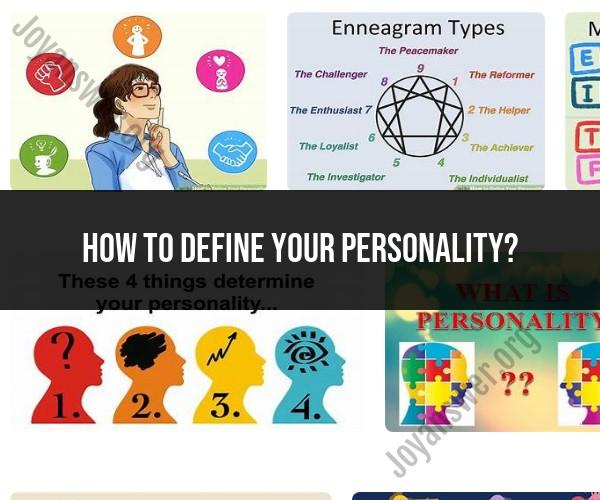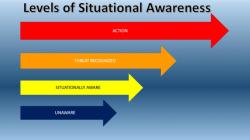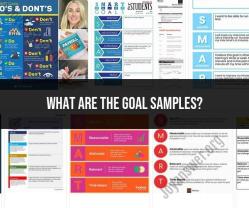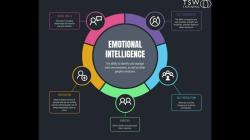How to define your personality?
Defining your personality is a journey of self-discovery that involves understanding your unique traits, behaviors, preferences, and characteristics. Here's a self-discovery guide to help you define your personality:
Self-Reflection:
- Take time to reflect on who you are. Ask yourself questions about your likes, dislikes, strengths, weaknesses, and values. Journaling can be a helpful tool for self-reflection.
Seek Feedback:
- Ask friends, family, and trusted individuals for feedback about your personality. They may provide insights you haven't considered.
Personality Tests:
- Take personality assessments and tests, such as the Myers-Briggs Type Indicator (MBTI), the Big Five Personality Traits, or the Enneagram. These tests can provide valuable insights into your personality traits and tendencies.
Interests and Passions:
- Consider your interests and passions. What activities make you feel most engaged and fulfilled? Your hobbies and interests can provide clues about your personality.
Values and Beliefs:
- Identify your core values and beliefs. What principles and ideals are most important to you? Values often shape personality.
Strengths and Weaknesses:
- Assess your strengths and weaknesses. Understanding your areas of excellence and areas that need improvement can give you insight into your personality.
Observation of Behavior:
- Pay attention to how you behave in different situations. How do you interact with others, respond to challenges, and handle stress? Your behavior is a reflection of your personality.
Life Experiences:
- Consider how past experiences, both positive and challenging, have shaped your personality. They can provide context for your traits and behaviors.
Seek Professional Help:
- If you're struggling to define your personality or seeking deeper insights, consider speaking with a therapist, counselor, or life coach. They can provide guidance and support.
Cultural and Environmental Influences:
- Be mindful of how culture, family, and your environment have influenced your personality. Cultural background and upbringing can play a significant role.
Traits and Characteristics:
- List the specific traits and characteristics that you believe define you. Are you introverted or extroverted? Compassionate or analytical? Organized or spontaneous?
Review Past Achievements:
- Consider your past accomplishments, both big and small. Your achievements can reveal aspects of your personality, such as determination, creativity, or leadership.
Dreams and Goals:
- Your dreams and life goals can also reflect your personality. What you aspire to achieve can provide insight into your values and priorities.
Personal Narrative:
- Create a personal narrative or story that summarizes your life journey and personality. This narrative can help you articulate who you are.
Accept Growth and Change:
- Understand that your personality is not static. It can evolve and change over time as you gain new experiences and insights.
Defining your personality is an ongoing process, and it's important to approach it with an open mind. Embrace the complexity and uniqueness of your personality, and use this understanding to make informed decisions, set personal goals, and build stronger relationships.
How to define your personality?
Personality is a complex concept, but it can be defined as the unique combination of thoughts, feelings, and behaviors that characterize an individual. It is what makes you different from everyone else.
There are many different ways to define your personality. One way is to think about your strengths and weaknesses. What are you good at? What do you need improvement in? What are your values and beliefs? What are your goals and aspirations?
Another way to define your personality is to think about how you interact with the world around you. Are you extroverted or introverted? Do you like to be around people or do you prefer to spend time alone? Are you organized and efficient or do you prefer to go with the flow?
What factors contribute to shaping an individual's personality?
There are a number of factors that contribute to shaping an individual's personality. These include:
- Genetics: Some personality traits, such as temperament and introversion, are thought to be influenced by genetics.
- Environment: The environment you grow up in, including your family, friends, and culture, can also play a role in shaping your personality.
- Life experiences: The experiences you have in life, both positive and negative, can also influence your personality.
Are there personality assessment tools or tests to gain insights into one's character?
Yes, there are a number of personality assessment tools and tests that can be used to gain insights into one's character. Some popular examples include:
- The Big Five Personality Test: This test measures five broad personality traits: Openness, Conscientiousness, Extraversion, Agreeableness, and Neuroticism.
- The Myers-Briggs Type Indicator (MBTI): This test classifies people into 16 different personality types based on their preferences for introversion vs. extraversion, sensing vs. intuition, thinking vs. feeling, and judging vs. perceiving.
- The Enneagram of Personality: This test identifies nine different personality types, each with its own unique set of strengths and weaknesses.
It is important to note that personality tests are not perfect. They are simply tools that can be used to gain insights into your personality. They should not be used to label you or to make predictions about your future behavior.
How do nature and nurture influence the development of personality?
Nature and nurture both play a role in the development of personality. Nature refers to our genetic makeup, while nurture refers to the environmental factors we are exposed to.
Genetics is thought to influence our personality traits such as temperament and introversion. Environment, on the other hand, is thought to influence our personality traits such as social skills and values.
It is important to note that nature and nurture do not work in isolation. They interact with each other to shape our personality. For example, a child who is born with a shy temperament may be more likely to develop social anxiety if they grow up in a socially isolating environment.
What are the key aspects to consider when exploring your own personality?
When exploring your own personality, it is important to consider the following key aspects:
- Your strengths and weaknesses: What are you good at? What do you need improvement in?
- Your values and beliefs: What is important to you? What do you stand for?
- Your goals and aspirations: What do you want to achieve in life?
- Your personality type: What is your personality type according to personality tests such as the Big Five, MBTI, or Enneagram?
- Your life experiences: How have your life experiences shaped your personality?
By considering these key aspects, you can gain a better understanding of your personality and how it influences your thoughts, feelings, and behaviors.
Exploring your personality can be a rewarding experience. It can help you to better understand yourself and to make choices that are aligned with your values and goals.













